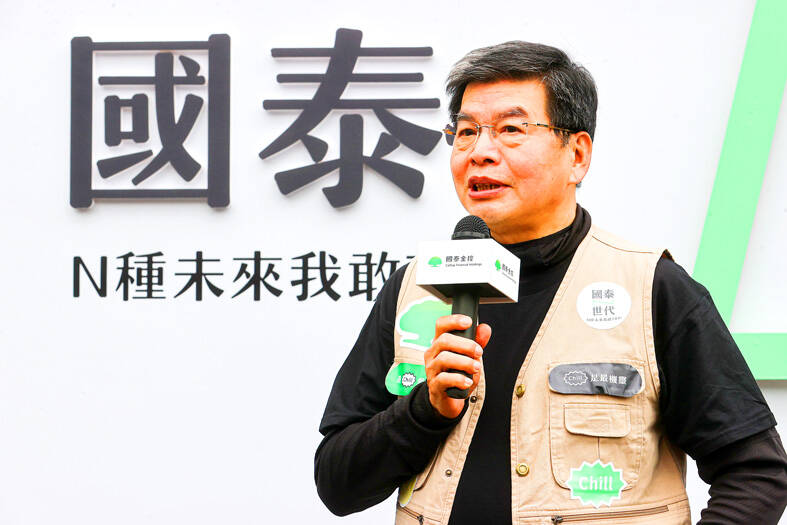Cathay Financial Holding Co (國泰金控), the nation’s biggest financial services provider, saw its net profit plunge 80 percent year-on-year to NT$6.88 billion (US$225.6 million) in the first quarter of this year, as its flagship unit Cathay Life Insurance (國泰人壽) drifted into the red due to its massive foreign exchange losses.
The life insurer lost NT$2.34 billion in the first three months after incurring losses due to the volatility in the New Taiwan dollar against the US dollar, the insurer said on Wednesday.
The NT dollar appreciated 2.18 percent against the US dollar in January, as traders expected the US Federal Reserve to slow the pace of its rate hikes, the insurer said.

Photo: CNA
However, the local currency depreciated rapidly versus the greenback in February, as high inflation and strong employment in the US prompted market speculation that the Fed might raise interest rates again, the insurer said.
The volatility in rates caused hedging costs against foreign exchange risks to rise and led to significant losses at Cathay Life Insurance, it said.
Cathay Life Insurance registered a loss of NT$2.6 billion for the first two months of this year, although it turned a profit of NT$260 million last month by using proxy hedging tools to manage its foreign exchange costs and by generating more recurring income, it said.
The life insurer said its foreign exchange reserves topped NT$42 billion at the end of last month, which would help absorb foreign currency losses and give it more flexibility in management.
However, Cathay United Bank (國泰世華銀行) saw its cumulative net profit rise 33 percent annually to a record NT$9.17 billion in the first quarter, after rate hikes by Taiwan’s central bank helped it gain 25 percent additional net interest income from a year earlier, the company said.
As private consumption rebounded after the COVID-19 pandemic, the bank recorded rising credit card spending and earned more net fee income, it said.
Although the bank ended its 10-year co-branded credit card partnership with Costco Wholesale Taiwan Ltd, it introduced a new credit card to retain customers.
The lender said it had 6.38 million valid credit cards in circulation as of the end of last month, the highest among its peers.
Cathay Century Insurance Co (國泰世紀產險) registered a net loss of NT$580 million during the first quarter, due to compensation payments to COVID-19 policyholders, it said.

Taiwan will prioritize the development of silicon photonics by taking advantage of its strength in the semiconductor industry to build another shield to protect the local economy, National Development Council (NDC) Minister Paul Liu (劉鏡清) said yesterday. Speaking at a meeting of the legislature’s Economics Committee, Liu said Taiwan already has the artificial intelligence (AI) industry as a shield, after the semiconductor industry, to safeguard the country, and is looking at new unique fields to build more economic shields. While Taiwan will further strengthen its existing shields, over the longer term, the country is determined to focus on such potential segments as

UNCERTAINTY: Innolux activated a stringent supply chain management mechanism, as it did during the COVID-19 pandemic, to ensure optimal inventory levels for customers Flat-panel display makers AUO Corp (友達) and Innolux Corp (群創) yesterday said that about 12 to 20 percent of their display business is at risk of potential US tariffs and that they would relocate production or shipment destinations to mitigate the levies’ effects. US tariffs would have a direct impact of US$200 million on AUO’s revenue, company chairman Paul Peng (彭雙浪) told reporters on the sidelines of the Touch Taiwan trade show in Taipei yesterday. That would make up about 12 percent of the company’s overall revenue. To cope with the tariff uncertainty, AUO plans to allocate its production to manufacturing facilities in

COLLABORATION: Given Taiwan’s key position in global supply chains, the US firm is discussing strategies with local partners and clients to deal with global uncertainties Advanced Micro Devices Inc (AMD) yesterday said it is meeting with local ecosystem partners, including Taiwan Semiconductor Manufacturing Co (TSMC, 台積電), to discuss strategies, including long-term manufacturing, to navigate uncertainties such as US tariffs, as Taiwan occupies an important position in global supply chains. AMD chief executive officer Lisa Su (蘇姿丰) told reporters that Taiwan is an important part of the chip designer’s ecosystem and she is discussing with partners and customers in Taiwan to forge strong collaborations on different areas during this critical period. AMD has just become the first artificial-intelligence (AI) server chip customer of TSMC to utilize its advanced

Chizuko Kimura has become the first female sushi chef in the world to win a Michelin star, fulfilling a promise she made to her dying husband to continue his legacy. The 54-year-old Japanese chef regained the Michelin star her late husband, Shunei Kimura, won three years ago for their Sushi Shunei restaurant in Paris. For Shunei Kimura, the star was a dream come true. However, the joy was short-lived. He died from cancer just three months later in June 2022. He was 65. The following year, the restaurant in the heart of Montmartre lost its star rating. Chizuko Kimura insisted that the new star is still down